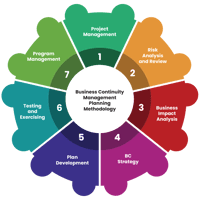What Exactly is Business Continuity Management?
Often, the way the terms are defined differs in the discussion of business continuity management (BCM).
To ensure consistency in our training of BCM professionals, including Crisis Management (CM), Crisis Communication (CC), IT Disaster Recovery Planning (DRP), and Operational Resilience (OR) professionals, the "BCM Umbrella" is one of several diagrams used to integrate and better explain the holistic view.
 Business Continuity Management, or BCM, is a holistic management process for identifying potential impacts from threats and developing response plans.
Business Continuity Management, or BCM, is a holistic management process for identifying potential impacts from threats and developing response plans.
The key objective is to increase an organisation's resilience to business disruptions and minimise their effects.

BCM Planning Methodology
 Potential threats can endanger the continuity of business processes, Information Technology (IT) infrastructures, and supply chain processes.
Potential threats can endanger the continuity of business processes, Information Technology (IT) infrastructures, and supply chain processes.
Applying the BCM Planning Methodology results in a response and recovery plan that will minimise the debilitating impact of threats and allow the continuity of the various business processes.
Here is an explanation of the disaster recovery for IT, business continuity, supply chain, and crisis from the "BCM Umbrella" shown above.
Disruption to IT: Disaster Recovery Planning
Disaster Recovery Planning, or DRP, is developing advanced arrangements and procedures that enable an organisation to respond to a disaster, resume critical business and IT applications within a predetermined period, minimise loss, and repair or replace the damaged facilities as soon as possible.
It is often called IT Disaster Recovery because "disaster recovery" is usually confused or used synonymously with "disaster management."
Disruption to Continuity of Business: Business Continuity
Business Continuity Planning or BCP is the process of developing prior arrangements and procedures that enable an organisation to respond to an event so that critical business functions can continue within planned levels of disruption.
The result of BC Planning is the BC Plan.
![]() Organisations should consider a scenario that could disrupt the Availability of People.
Organisations should consider a scenario that could disrupt the Availability of People.
An example is a Pandemic Influenza or Infectious Disease outbreak. The plan has two aspects: a Pandemic Preparedness Plan and a Pandemic Flu BC Plan.
Disruption to Suppliers: Supply Chain Continuity
Supply Chain Continuity Management refers to ensuring an uninterrupted flow of products and services from suppliers to customers within an acceptable level and time frame to safeguard the organisation's prioritised activities and those of interested parties.
Disruption to the Organisation Due to Crisis
Crisis Management or CM is the overall coordination of an organisation's response to a crisis, in a practical, timely manner, intending to avoid or minimise damage to the organisation's profitability, reputation, or ability to operate.
The terms incidents, emergency and events will be explained in another blog.
Reflection
It is important to note that definitions are meaningful when everyone involved in the project or program has a common understanding.
Often, I hear arguments among team members and even senior management about the plan's objectives. The bottom line is that they have not established a common understanding of the terms.
I often commented that the current definition is wrong and replied that the key is that the developed plans are consistent within that particular organisation.
Most importantly, the team will work together to make the "specific" plan clear and concise for each member executing it.
More Information About Business Continuity Management Courses




![Register [BL-B-3]*](https://blog.bcm-institute.org/hs-fs/hubfs/hub_generated/resized/19a8306f-6b76-45ff-8585-95111f393aeb.png?width=200&height=56&name=19a8306f-6b76-45ff-8585-95111f393aeb.png)



![FAQ [BL-B-3]](https://blog.bcm-institute.org/hs-fs/hubfs/hub_generated/resized/9b7f5669-8ad6-450b-a98f-5f5d49ebfc8e.png?width=150&height=150&name=9b7f5669-8ad6-450b-a98f-5f5d49ebfc8e.png)
![Email to Sales Team [BCM Institute]](https://blog.bcm-institute.org/hs-fs/hubfs/hub_generated/resized/83ae9ad3-affc-416e-8f51-64218d6d98f2.png?width=100&height=100&name=83ae9ad3-affc-416e-8f51-64218d6d98f2.png)





